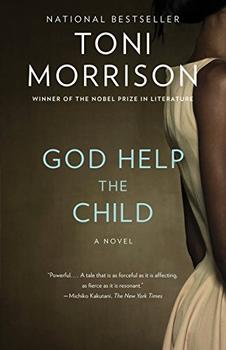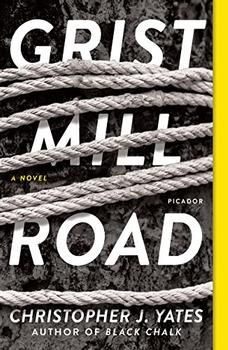Summary | Excerpt | Reading Guide | Reviews | Beyond the book | Read-Alikes | Genres & Themes | Author Bio

A novel
by Toni MorrisonIn God Help the Child, internationally acclaimed author Toni Morrison returns with a beautifully told, heart-wrenching story set in contemporary times — of Lula Ann Bridewell, a young black woman.
Rejected by her mother because of her dark blue-black skin, Lula Ann has nevertheless built a successful life. Even if Pecola, the protagonist in Morrison's first novel, The Bluest Eye, struggles against her appearance, desperate in her desire for light skin and blue eyes, Lula Ann embraces her blackness. She makes it part of her beauty — always wears white clothes and shortens her name to Bride. She is the brains behind a successful new cosmetics company and is in love with her boyfriend Booker.
But Bride's life will soon implode: First, Booker leaves her, saying only: "You not the woman I want." Also, when Bride was eight years old she was a key witness in a trial that resulted in Sofia Huxley, a teacher, being imprisoned for child abuse. Now Sofia is about to be released and Bride, in a decision she will come to regret, is naively determined to help her.
God Help the Child is the story of Bride's determination to find Booker and understand the reasons for his abandonment. Also, in her need to revisit the truth about the court case she was involved in as a child, the story becomes an emotional and physical voyage back to her own childhood. In a touch of magical realism that parallels her return to innocence and the truth, Bride's body returns to a child's form.
Although the novel is short, only one hundred and eighty three pages long, Bride's story is packed with incidents and an array of minor characters whose strengths and failings augment the central thrust of the story. Rain, a young girl Bride encounters on her journey, is a victim of abuse; Queen has had multiple husbands and children but lives alone. In many ways this is a sorrowful novel. Bride has suffered her mother's rejection: "I always knew she didn't like touching me," she says. "I used to pray she would slap my face or spank me just to feel her touch." Booker has lost a brother in violent circumstances, murdered by a man whose neighbors considered him "the nicest man in the world." Yet the "nicest man in the world" also happens to have the names of six boys he has molested and killed, tattooed across his shoulders.
Morrison's characters are flawed but can also be heroic. Despite the trials they have faced, they move forward, and remain optimistic, sometimes naively so.
Regardless of what these characters might believe, however, a tone of skepticism and mistrust remains perhaps warning readers that naivete and optimism are not the same thing. Life, as shown to us in God Help the Child, is hard and often painful, even if there is hope that circumstances can and do get better.
Inhabiting her characters' lives and voices, in a story told from multiple perspectives, Morrison examines the beauty and ugliness in all our lives, in a memorable story, skillfully told.
![]() This review was originally published in The BookBrowse Review in April 2015, and has been updated for the
February 2016 edition.
Click here to go to this issue.
This review was originally published in The BookBrowse Review in April 2015, and has been updated for the
February 2016 edition.
Click here to go to this issue.

If you liked God Help the Child, try these:

by Christopher J. Yates
Published 2018
The highly anticipated new novel from the author whose debut was called "The smart summer thriller you've been waiting for...The novel you should be reading tonight" (NPR's All Things Considered) and was named a Book of the Year by NPR and an Entertainment Weekly Must-List Pick.

by Samantha Hunt
Published 2017
A contemporary gothic from an author in the company of Kelly Link and Aimee Bender, Mr. Splitfoot tracks two women in two times as they march toward a mysterious reckoning.
What really knocks me out is a book that, when you're all done reading, you wish the author that wrote it was a ...
Click Here to find out who said this, as well as discovering other famous literary quotes!
Your guide toexceptional books
BookBrowse seeks out and recommends the best in contemporary fiction and nonfiction—books that not only engage and entertain but also deepen our understanding of ourselves and the world around us.